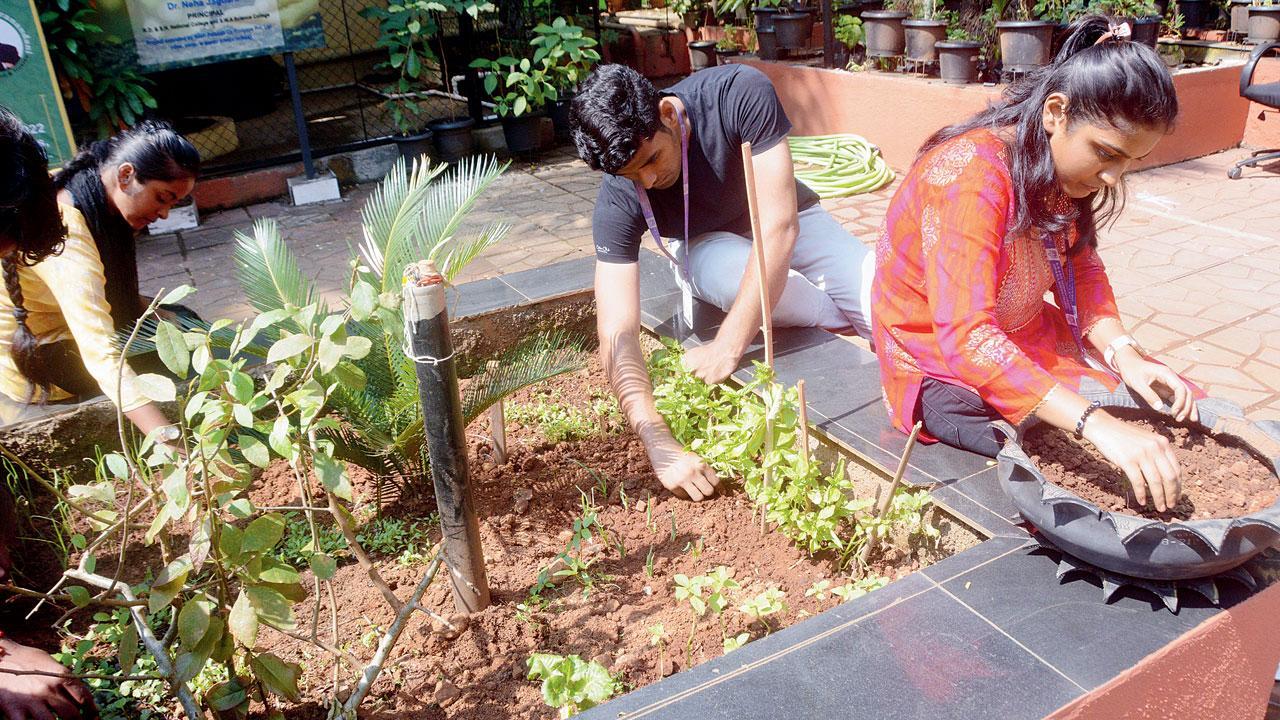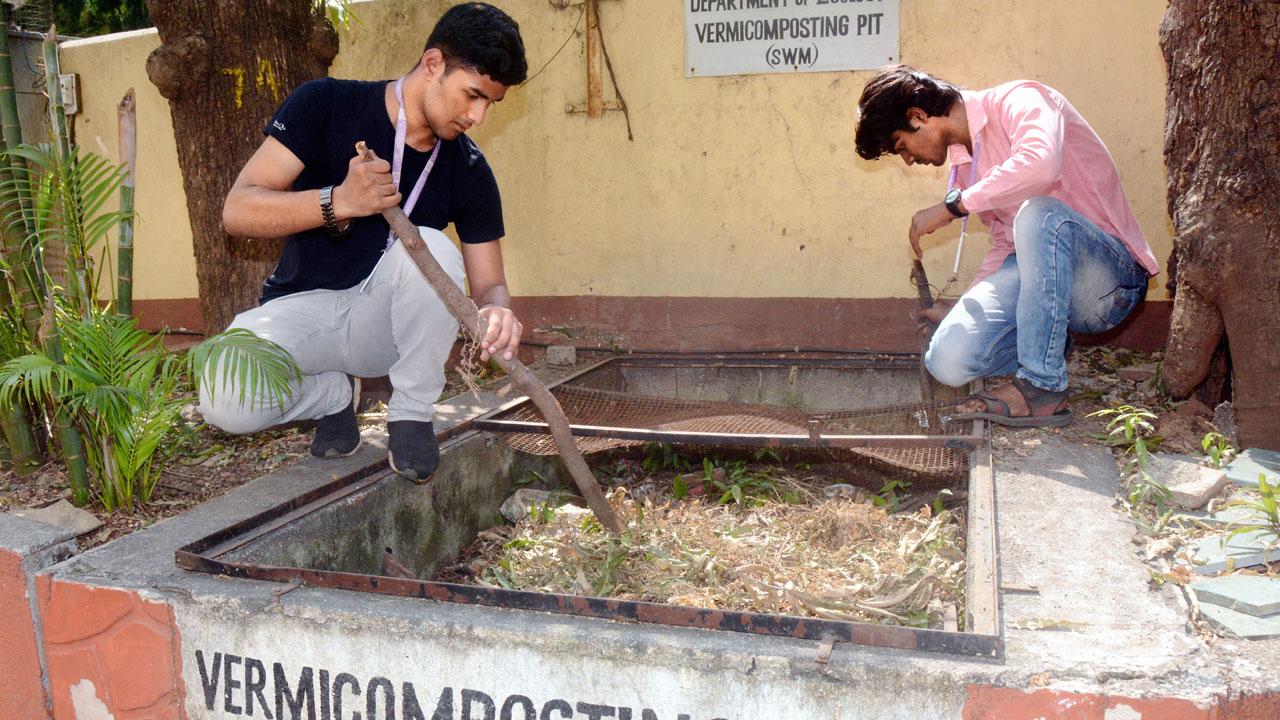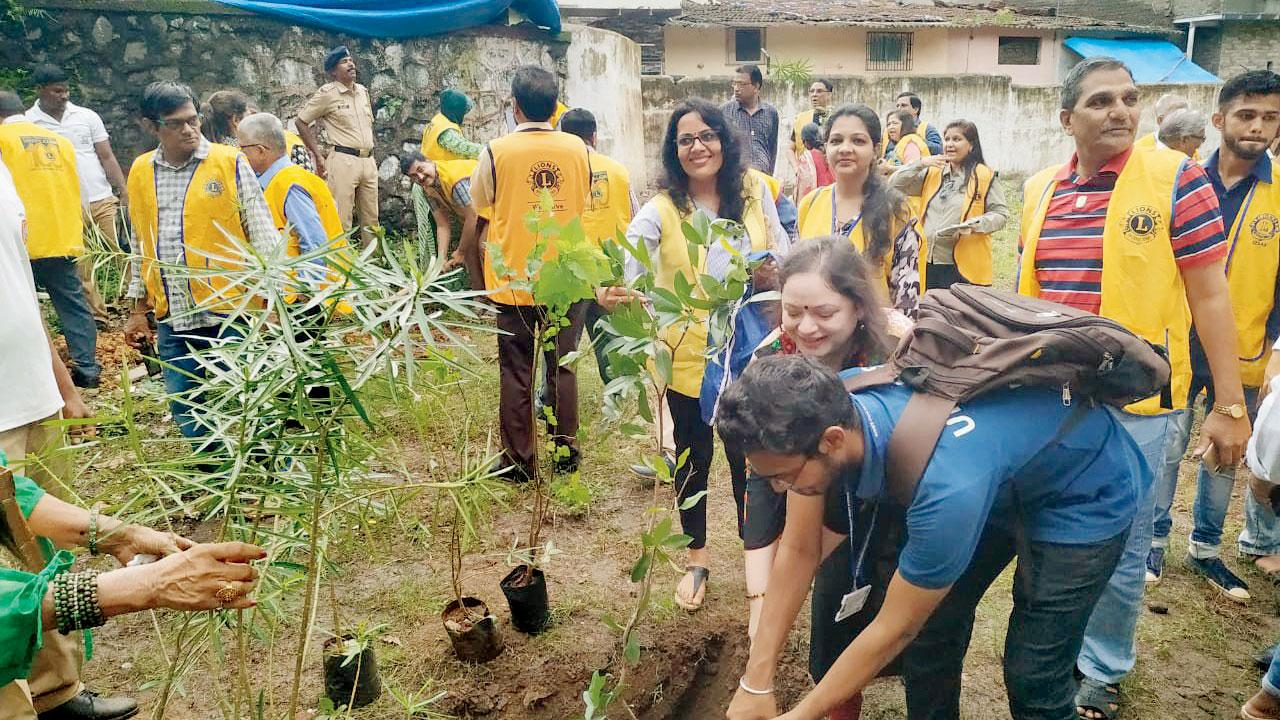With organic farming projects, Mumbai-based colleges have taken up the onus to bring their students close to nature

Garlic, mint, basil, etc are harvested in the small space at National College, Bandra. Pics/Satej Shinde
In the midst of a concrete jungle, students of colleges such as Matunga’s Ruia, Bandra’s National College, and Vile Parle’s Usha Pravin Gandhi (UPG) are farming organically. On October 17, Union minister for Road and Transport, Nitin Gadkari, inaugurated an organic garden at RD & SH National College; he had suggested the idea to Principal Neha Jagtiani when she went to invite him to a function. In a small 6ft x 6ft compound bang in the middle of the campus, students now sow seeds, compost wet waste from the canteen, and nurture a vegetable garden in their free time. So far, they have sown garlic, apple mint, purple radish, basil, herbs and different types of lettuce. “We recycle old car tyres into planters, and place them at different places across the campus. Now we are waiting to get a bigger space to expand our harvest,” said Mona Kejariwal, head of Botany department of National College.
ADVERTISEMENT
“Most of us were not interested in organic farming,” said Zoya Ansari, who is in the first year of the degree course in Botany. “It seemed like another boring activity, but we had to do it as a project. Then we understood the nitty gritties, and it became interesting to care for a plant and watch it grow.”

Wet waste from the canteen is converted into compost by the students
The faculty of Usha Pravin Gandhi enjoys a cup of tea in their staff room, the organic ingredients for the brew come from the campus garden. Anju Kapoor, UPG’s principal is rightfully proud of the Social Outreach Unit that tends to it. “Our students are mostly from urban backgrounds, and disconnected with nature. Our motive was to encourage them to connect with it,” she said.
Also Read: Mumbai Crime: 30-year-old man badly hurt in Chembur hit-and-run
UPG’s garden was sown on the terrace just before the pandemic. With no one to tend to it during the COVID-19 enforced lockdowns, it wilted away. Now its 50-odd plants yield tomato, okra, ginger, lemongrass, ajwain, bitter gourd, limes, and capsicum. The wet waste from the canteen is composted into rich soil. “We invited local nurserymen as well as students from other colleges to help revive the garden,” said Kapoor. The intrepid gardeners also set up a solar drip irrigation machine, which routes water from AC ducts to the plants.
“Post the pandemic,” said Kapoor, “the younger generation become more environmentally cautious and actively worked towards preserving it. They get so excited to see something they have grown. Some students, and even teachers, take vegetables home.”

A regular activity at UPG college, students and teachers together plant saplings on the college premises
Located in the heart of Mumbai, the Ramnarain Ruia Autonomous College of Science and Arts is crowned by a 1,000-sq ft polyhouse. “It was set up for the students of the Bachelor of Vocation course that has since been split into smaller certificate courses,” said Anushree Lokur, the principal. The polyhouse on the terrace has five netted shade houses inhabited by ferns, medicinal plants and a variety of orchids. Some of these thrive in a soil-less environment, nurtured by hydroponic systems such as aquaponics, deep water culture, ebb and flow and aeroponics. The college now offers certificate courses in organic gardening, aquascaping and interior scaping, techno-commercial aspects of urban farming, floristry, hydroponics, kitchen gardening, terrarium making, and bonsai making. The students in each of these courses— about 20 to 25 in a batch—tend to the polyhouse.
“Most of the students are homemakers who want to make kitchen gardens, professionals exploring a hobby, and school children,” said Lokur. College students get extra credits for participating. “Many former students have started their own business,” said Jessy Pius, head of the Botany department. “Some of our alumni have turned entrepreneurs in the fields of landscape design, greenhouse construction, garden maintenance and fabrication of hydroponic systems.” The harvested mint, basil, pok choi, lettuce, red amaranth, spinach, tomato, snake gourds, flat beans, and herbs are sold by students to the staff and other students at a nominal price.
National College also has a digital medicinal garden for the students to practise vertical farming. “We have one plant for every part of the body and disease,” said Jagtiani. Every sapling has a barcode. “Whenever we are curious about a disease, we scan a barcode which gives us information about the plant’s Latin name, genus, healing properties and how to use it,” said Atif Assar, National college student. A college such as National has about 7,500 students, and even if some of these students replicate the garden in their homes, believes Jagtiani, it would impact the city positively. “We watch the students enjoy interacting and discussing the farming process, and becoming more responsible towards the environment. They will cherish these experiences for a lifetime,” said Kapoor.
 Subscribe today by clicking the link and stay updated with the latest news!" Click here!
Subscribe today by clicking the link and stay updated with the latest news!" Click here!







